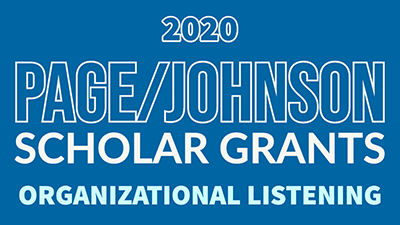2020 Page Center grants seek to learn how corporations listen
May 7, 2020 • Jonathan McVerry

The Arthur W. Page Center announced the recipients of its 2020 Page/Johnson Legacy Scholar Grants. Led by senior research fellow Katie Place, this year’s call will fund 12 projects that examine “organizational listening,” its role in successful corporate communications and the consequences of when companies don’t listen.
The 2020 call will uncover the importance of listening at all levels of an organization. Place, associate professor of strategic communications at Quinnipiac University, and Page Center director Denise Bortree say it’s an area of study that has not received enough attention among public relations and public communications research.
“By exploring how an organization defines or practices listening as part of its public relations efforts, we can gain insights regarding the cultural, structural, or philosophical approaches it employs to best engage and forge trusting, respectful relationships with publics,” Place said.
Through the work of more than 25 Page Center scholars (listed below), these projects will reveal viewpoints from many approaches and communications frameworks. Topics include diversity, employee silence, listening to marginalized publics, rebuilding trust through listening, social listening, and others. One project asks, “What happens when organizations don’t listen?” The projects from this year’s grants will be completed by the end of the summer of 2021.
“I became intrigued by the concept of listening when a public relations executive shared the importance of ‘listening loudly,’” Place said. “This collection of research seeks to understand how listening underscores everything we do in public relations – from engaging in dialogue, fostering relationships or communicating ethically and inclusively.”
This is the 16th year the Center is supporting timely and important communication research. Including this year’s call, it has funded hundreds of scholars from universities all over the world and awarded more than $900,000 in research funding since 2004.
For the first time, the Page Center will be inviting its advisory board to hear this year’s group of scholars present their research ideas and results. The first of these sessions will be held in August when scholars will give the 15-member advisory board the opportunity to see their research in its early stages. Next year, at the end of the term, select scholars will present their results to the board.
“We are lucky to have an advisory board with decades of experience in business, public relations and journalism,” Bortree said. “Connecting their experience and expertise with our scholars’ work and innovation is a partnership that will result in stronger, more practical research.”
The 2020 Page Center Research Grants on Organizational Listening:
Developing a Scale of Organizational Listening
Giselle Auger, Rhode Island College, and Moonhee Cho, University of Tennessee
A Study of Stakeholders' Conceptualizations of Organizational Listening
Diana Sisson, Auburn University; Graham Bodie, University of Mississippi; and Debra Worthington, Auburn University
Breaking Employee Silence via Employee Dialogic Engagement: A Model of Employee Silence at Individual, Organizational, and Cultural Levels and a Proposal of Internal Organizational Listening Competency Diagnostic Tool
Minjeong Kang and Bitt Moon, Indiana University
In search of representativeness and diversity: Organizational listening in a multi-stakeholder environment
Lisa Tam, Queensland University of Technology; Helen Hutchings, Philips Group; and Soojin Kim, University of Technology Sydney
City of Fort Worth’s Efforts to Listen and Re-build Trust Among Diverse and Marginalized Stakeholders
Julie O’Neil, Jacquie Lambiase, Ashley English, Texas Christian University
Harnessing the Power of Chatbots for Organizational Social Listening
Rita Men, University of Florida; Alvin Zhou, University of Pennsylvania; and Sunny Tsai, University of Miami
Ethical Organizational Listening for Stakeholder Engagement and Responsibility
Marlene Neill, Baylor University and Shannon Bowen, University of South Carolina
Organizational Social Listening & Corporate Climate Advocacy: What Happens When Organizations Don't Listen
Ioana Coman and Rosalyn Vazquez, Texas Tech University
Extending Civic Values in Architectures of Listening: Arendt, Mouffe, and the Pluralistic Imperative for Organizational Listening
Luke Capizzo, James Madison University
Listening to Historically Marginalized Publics: Brand Activism and LGBTQ Stakeholders
Ha Young Lim, Erica Ciszek, Won-Ki Moon, University of Texas at Austin
Toward a Normative Internal Communication Model for Gender Discrimination in the Workplace: A Cross-Cultural Study
Yeunjae Lee, Jo-Yun Queenie Li, Wan-Hsui Sunny Tsai, University of Miami
Assessing Stakeholder Expectations for Organizational Social Listening
Sarah Maben and Christopher Gearhart, Tarleton State University

